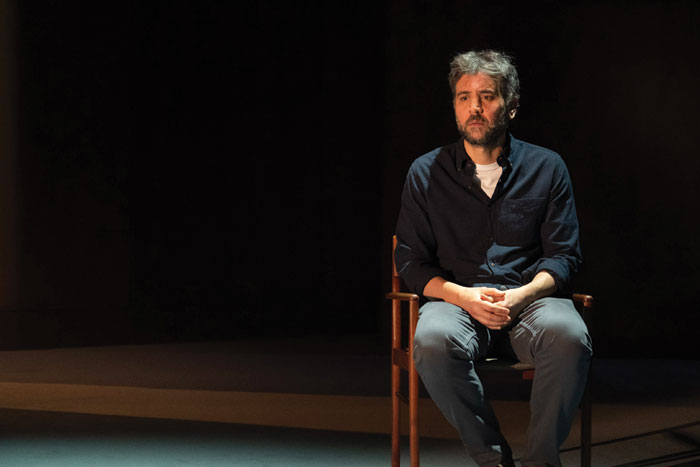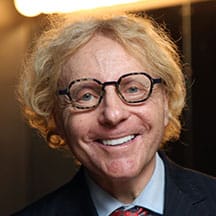 Josh Radnor in the world premiere production of “The Ally,” written by Itamar Moses and directed by Lila Neugebauer. Photo credit: Joan Marcus.
Josh Radnor in the world premiere production of “The Ally,” written by Itamar Moses and directed by Lila Neugebauer. Photo credit: Joan Marcus. “The Ally,” a new play by Itmar Moses, is running Off-Broadway at The Public Theater through March 24. It is an excellent piece of dramatic storytelling that commands one’s full attention. A cast of seven actors is tasked with two-and-a-half hours of engrossing dialogue and impassioned, wordy speechmaking, which is rare in theater — even in a straight play.
For all its many virtues, however—the scale of its intellectual ambitions, its vast information overload—the play might have better been titled “How I Met My Jewish Self, and Wouldn’t Stop Squirming.”
The acting is superb, featuring Josh Radnor, best known for TV’s “How I Met Your Mother.” For all its many virtues, however — the scale of its intellectual ambitions, its vast information overload—the play might have better been titled “How I Met My Jewish Self, and Wouldn’t Stop Squirming.”
You guessed it: A play about a self-inflicted tortured Jew, centering on the most provocative topic of these recent days: the conflict in the Middle East. And it was written before October 7. A tale of two selves, “The Ally” is being mounted during the best of times, and the worst. Many people are confused about which story to believe: Palestinian suffering caused by Jewish war-making; or Gazan savagery that must once and for all be eliminated with Jewish self-defense.
“The Ally” arrives at a propitious, yet extremely delicate, moment.
Radnor plays a Jewish playwright living with his Asian wife in a California college town that is a proxy for Berkeley. His parents were Israeli-born but long ago left the Jewish State. Their son grows to become an artist and ardent atheist with no ties to Israel. During his college years, he dates a progressive African-American activist. (His mother presumably loved her.) She returns to his life 20 years later, when the play is set, having graduated to full woke-hood with a radicalized anti-racist, anti-white, anti-colonialist, anti-capitalist, anti-American, and, of course, antisemitic agenda.
His wife also works at the university, which is expanding and seen as a gentrifier of the neighborhood (the modern version of land-grabber). He, too, teaches there. One of his students, an African-American male, asks him to sign a social justice manifesto, written by Radnor’s old girlfriend, inspired by the police shooting of his cousin — à la George Floyd. Within a text replete with racial inequities lies the central tension of the play: Israel is accused of being an apartheid state and oppressor of Palestinians, who are allied with all persons of color.
The playwright signs the petition and unleashes a torrent of Israel acrimony, culminating in a guest speaker who declaims that Israel provoked every single war in which it has fought, all for the purpose of plundering more Palestinian land.
The play is a full Middle East workout, mental gymnastics vaulting every single issue that permeates the college campus and public square, including the tensions between Blacks and Jews. It’s also a spin class with a pro-Palestinian spin.
But not entirely. There’s a kippah-wearing student who delivers a long and compelling dissection of how the anti-Israel argument is simply the repackaged Jew-hatred of old, now adorned with highbrow human rights pretensions.
There are two other students: an insufferable Jewish college student who has swallowed every anti-Israel canard in the book; and her student activism colleague, a male Palestinian who offers his own long brief in what Israel has done to his people — and how logical it was for Palestinians to resort to terrorism, in return.
Surrounded by all these forces allied against the Jewish people, Radnor spends much of the play writhing in anguish, bending over backwards to appease and acquiesce to every single Jewish indictment. Squeamish, fidgeting and uncomfortable throughout, he is an awful and faint-hearted defender of his people.
I was amazed that he didn’t break in half, and then subdivide into further emasculations of the self. What manner of Middle East milquetoast is such a man?
“The Ally” is the high art of moral relativism, the antiestablishment art of the progressive left. No one should be surprised by its tone or tilt. It is not your grandmother’s “Exodus.”
“The Ally” is the high art of moral relativism, the antiestablishment art of the progressive left. No one should be surprised by its tone or tilt. It is not your grandmother’s “Exodus.”
Actually, Israel doesn’t usually fare well in art, whether in plays, novels or films — especially when it comes to war. The same could be said for America, with most movies, apart from “Zero Dark Thirty” and “American Sniper,” casting the United States as the evil empire. (Think: “The Deer Hunter,” “Coming Home,” and “Platoon.”)
Watching the play as a Zionist, and in possession of some moral clarity when it comes to the actors and actions in Gaza, is an alienating experience. For all its head-spinning, “The Ally” refuses to find a single moment when Israel is defended outright and forthrightly. Instead, the play is a paean to the kind of complexity, nuance and moral narcissism that is catnip for liberal Jews.
The Palestinian student speaks of the “erasure of my people” — a people who have grown fourfold since 1948. Radnor’s character makes that point, but he fails to add the irony that it was his people that lost two out of every three Jews in Europe — a far more serious and irrefutable subtraction. The student names three Palestinians who are more like Mahatma Gandhi than Genghis Khan, but where are they, and why is it Israel’s fault that 75% of Palestinians prefer Hamas’ negotiating tactics to anything resembling peaceful nonviolent resistance?
Meanwhile, the injustices visited upon Blacks and Palestinians, and why they must be allied against Israel, are why this explosive manifesto has such a nauseating resonance. It’s why the play unfolds as two Blacks, one Palestinian, one Jew and an Asian are all ganging up on a wimpy Jew who is already sympathetic to their cause.
The woke left simply refuses to see Jews as victims — now and in the past — and regards any special pleading for Israel as ultimately racist and vulgar. And the disdain is accompanied by ingratitude. The Black activist makes it clear that African-Americans are in no way beholden to Jews for their involvement on the front lines of the Civil Rights Movement.
Martin Luther King Jr would have been appalled and stormed out of the theater.
Yes, I know: the play is set in a fictional Berkeley, and while frightening to many Jewish Zionists and patriotic Israelis, “The Ally,” in northern California, is right up the tikkun olam alley of what passes for liberal Judaism.
The terrible takeaway from this play is that Israel has no true actual allies. At best, it has national acquaintances, shared global interests, and far too many diplomatic entanglements. As for American Jews, “The Ally” is a reminder to take note of their own conditional relationships and fickle friends.
Thane Rosenbaum is a novelist, essayist, law professor and Distinguished University Professor at Touro University, where he directs the Forum on Life, Culture & Society. He is the legal analyst for CBS News Radio. His most recent book is titled “Saving Free Speech … From Itself.”























 More news and opinions than at a Shabbat dinner, right in your inbox.
More news and opinions than at a Shabbat dinner, right in your inbox.